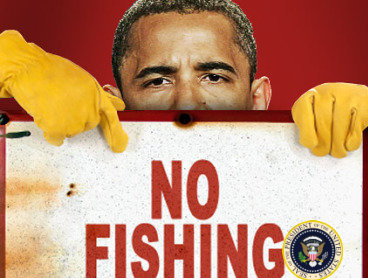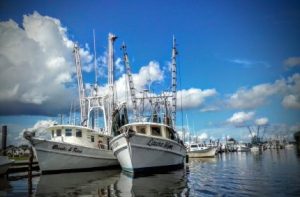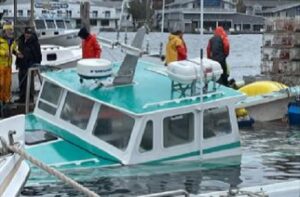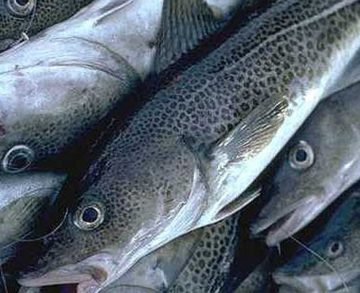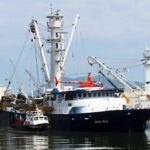Tag Archives: National Geographic
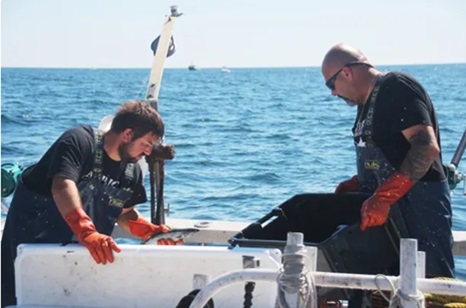
‘Wicked Tuna’ to End With Season 13 on National Geographic
“Wicked Tuna” has been canceled by National Geographic following the conclusion of its Season 13 run. “After thirteen seasons on the high seas and more than 200 incredible episodes, the long-running series ‘Wicked Tuna’ has concluded its run on National Geographic,” the cable channel said in a statement Friday. “The series celebrated one of America’s oldest industries since first premiering on National Geographic in 2012 and made internationally recognizable stars out of the intrepid commercial fishermen who brave the unrelenting North Atlantic waters to catch the elusive bluefin tuna. The cancellation of “Wicked Tuna” comes amid major cost cutting at National Geographic parent company Disney, which is consolidating operations among its linear TV networks. more, >>CLICK TO READ<< 18:01
“Wicked Tuna” and lucky number 13
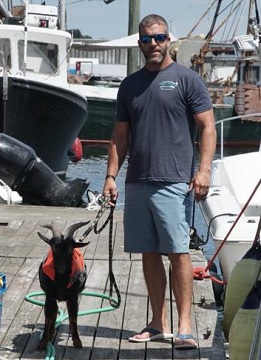 Number 13 is a fortuitous number for National Geographic’s hit reality television series “Wicked Tuna.” The show is now shooting its 13th season. And it is a lucky number for Gloucester Capt. T.J. Ott of the vessel Hot Tuna who won the title of G.O.A.T. — Greatest of All Time — at the conclusion of season 12 by hooking a total of 13 fish valued at $70,148. He edged out by $218 Beverly’s Capt. Bob Cook who caught a dozen fish valued at $69,930. The hit show, based out of Gloucester, America’s oldest seaport, chronicles a competition among fishermen and fisherwomen in search of giant bluefin tuna. 7 Photos, >click to read< 16:24
Number 13 is a fortuitous number for National Geographic’s hit reality television series “Wicked Tuna.” The show is now shooting its 13th season. And it is a lucky number for Gloucester Capt. T.J. Ott of the vessel Hot Tuna who won the title of G.O.A.T. — Greatest of All Time — at the conclusion of season 12 by hooking a total of 13 fish valued at $70,148. He edged out by $218 Beverly’s Capt. Bob Cook who caught a dozen fish valued at $69,930. The hit show, based out of Gloucester, America’s oldest seaport, chronicles a competition among fishermen and fisherwomen in search of giant bluefin tuna. 7 Photos, >click to read< 16:24
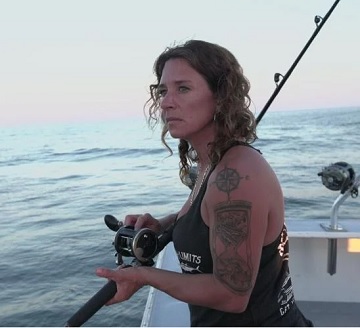
Woman captain joins ‘Wicked Tuna’ for 12th season
Filmed on location in Gloucester and on the North Atlantic Ocean, the show follows experienced fishermen from the nation’s oldest seaport, chronicling their triumphs, challenges and the ones that get away. Of the eight captains, four are from Gloucester, two are from Beverly and two are from New Hampshire. The newcomer up against the veteran competitors is Capt. Michelle Bancewicz of the 31-foot No Limits, who joins the fleet with her first mate Lea Pinaud. Bancewicz had an epic catch in October 2021 that made the news and went viral around the globe when she single-handedly brought in an 800-pound tuna. Bancewicz, of Seabrook, New Hampshire, has been fishing recreationally since she was a youngster. Photos, >click to read< 10:52
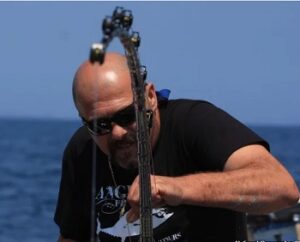
Facts About Wicked Tuna’s Dave Marciano You Won’t Have to Fish For
When selecting captains for the reality series “Wicked Tuna,” National Geographic definitely made a great choice with veteran seaman commercial fisherman Dave Marciano. Ever since he was a young boy, the fisherman has spent so much of his life at sea that it became a fundamental part of his identity long ago. It would be foolish to think that Marciano’s life hadn’t changed dramatically since the show premiered in 2012, but deep down, it really seems like the captain has remained the same devoted and incredibly hard-working individual he always has been, and its those qualities that make his such a relatable personality on that show that many audience members cannot help but root for. His fascinating past has made him the man he is today and here are the pivotal aspects of that journey leading to reality stardom. Photos, >click to read< 14:14
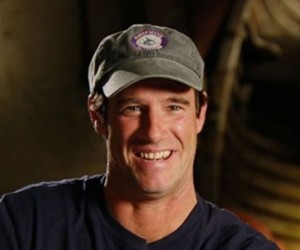
‘Wicked Tuna’ returns for Season 11
The tuna fishermen in the National Geographic hit series “Wicked Tuna” were not crushed by the global COVID-19 pandemic, although they too faced the challenges of a world economy turned upside down. But the “monstah” bluefin tuna competition is back. Season 11 kicks off on NatGeo TV with the extended 90-minute episode “Back on the Hunt” this Sunday, Feb. 27, at 9 p.m. Filmed on location in Gloucester and at sea, the show follows experienced fishermen from the nation’s oldest seaport, chronicling their triumphs and sometimes the ones that get away. Of the eight captains, half are from Gloucester, and two are from Beverly. The other two are from New Hampshire and New Jersey. >click to read< 21:24
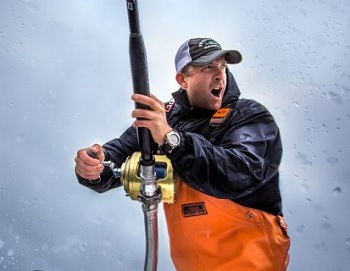
Podcast: FV-Tuna.com Capt. Dave Carraro previews Wicked Tuna Outer Banks season finale
Capt. Dave Carraro has been a mainstay and a fan favorite on National Geographic’s hit series, Wicked Tuna, which chronicles the lives of commercial bluefin tuna fishermen in America’s oldest seaport – Gloucester, Massachusettes. He is the legendary captain of the FV-Tuna.com, and has an unprecedented five wins on Wicked Tuna. Carraro’s repeated success and highly competitive nature sometimes put him at odds with the rest of the fleet, but he is notoriously more interested in catching fish than making friends. Listen to the podcast! >click to read< 10:03
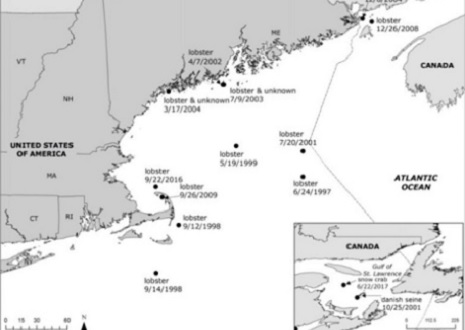
North Atlantic Right Whale: How to kill a species with Fake News, from National Geographic of all places!
“Fishing without vertical lines is what is going to save this species.“ says CT Harry of the IFAW who work hand in hand with NOAA. A ridiculous statement in view of the 18 cruise ship strikes in the Gulf of St. Lawrence (GSL) in the past few years, in all of NE over 20 years. ¼ whale per year by the lobster industry. Eighteen ship strikes in the GSL over the past 3 years averages 6 per year. These people are killing 24 whales while those people kill one. by Jim O’Connell >click to read< 13:22
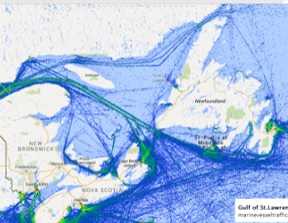 Most likely Carnival Cruise Lines is responsible for 18+ Right Whale deaths in the past 3 year, at which rate they would soon be extinct. – Human caused Right whale deaths have suddenly, in sync with a plummeting whale birthrate, put the right whale on the path to extinction. Why their birth rate, births per year, declined since a tremendous surge in 2000-2009 from 350 to 500 is unknown. In 2018 it hit bottom as no calves were born. >click to read<
Most likely Carnival Cruise Lines is responsible for 18+ Right Whale deaths in the past 3 year, at which rate they would soon be extinct. – Human caused Right whale deaths have suddenly, in sync with a plummeting whale birthrate, put the right whale on the path to extinction. Why their birth rate, births per year, declined since a tremendous surge in 2000-2009 from 350 to 500 is unknown. In 2018 it hit bottom as no calves were born. >click to read<
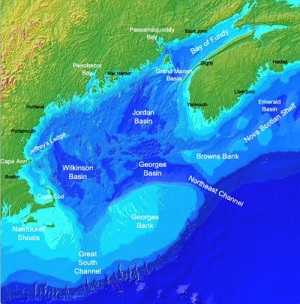
The Voice Of The Lobster
Over in the Tweetiverse, someone was all boo-hoo about the eeevil effects of “climate change” that he claimed had “already occurred”. He referenced a publication from a once-noble organization that sadly has drunk the “CLIMATE EMERGENCY” koolaid, National Geographic. So I read it, and the only thing in that, other than what “might” and “probably” and “could” occur at some uncertain time in the future, was a mention of “oceanic heatwaves” in Maine and surroundings, viz: “The U.S. is already grappling with climate change’s heavy costs, like when a powerful ocean heatwave struck the Northeast and devastated the region’s lobster fishery.” As a long-time commercial fisherman, that piqued my interest. So I looked to see what I could find out. >click to read< 05:56
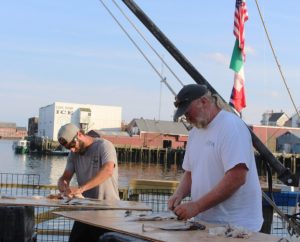
Gloucester – Marciano Challenge Fish Filleting Premiere
The first Marciano Challenge Fish Filleting event was held at the Gloucester House last night in front of a good sized crowd interested in the finer aspects of fish cutting. Haddock donated by the fishermen was filleted, timed and judged for quality by Mayor Sefatia Romeo Theken and event creator Tina Greel. A bunch of great photo’s! >click to read< 09:40
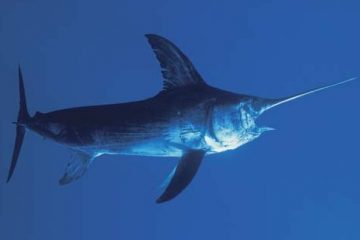
CALIFORNIA VOTES TO MAKE ITSELF MORE RELIANT ON IMPORTED FISH
California lawmakers passed legislation that would ban drift nets and help save endangered sea animals, but critics argue such a ban would ultimately have the opposite effect.,,, “I don’t know what I’d do,” Mike Flynn — who has depended on drift gill nets to capture swordfish for 40 years — said in a statement to NBC Bay Area. “There’s very few of us left, and we don’t seem to have a chance … we’re being villainized, unjustly.”,, The campaign to ban large drift nets in California began several years ago. Environmental groups — Mercy for Animals, Sea Legacy, Turtle Island Restoration Network and others,,sent a team of photographers underwater with the goal of capturing heart-wrenching pictures of trapped fish. The photos were used by activists to demand a ban. >click to read< In a related post about the photographer, SHOCKER: National Geographic admits they were wrong about “starving polar bear” video – >click to read<10:01
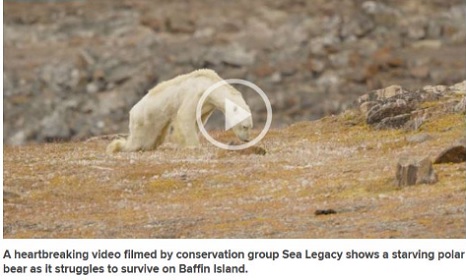
SHOCKER: National Geographic admits they were wrong about “starving polar bear” video
Dr. Susan Crockford says in an essay: Remember that video of an emaciated Baffin Island polar bear that went viral last December? In an unexpected follow-up (“Starving-Polar-Bear Photographer Recalls What Went Wrong“; National Geographic, August 2018 issue), photographer Cristina Mittermeier makes some astonishing admissions that might just make you sick. It turns out they didn’t just come across the dying bear the day it was filmed: it was spotted at least two days earlier by Paul Nicklen. He must have had a satellite phone with him when he saw the bear but the only call he made was to his film crew — he made no attempt to find a local conservation officer to euthanize the bear, which would have been the right thing to do.,,>click to read<15:41
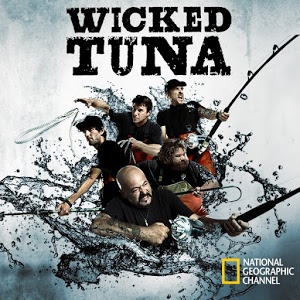
Closing out the seventh season, ‘Wicked Tuna’ celebrating 100th episode
The hit National Geographic reality series “Wicked Tuna” is going to close out its seventh season with its 100th episode Sunday night. When producers first came to Gloucester back in 2011, none of the captains realized what they were in for. Even Capt. Dave Marciano of Beverly, who fishes out of Gloucester, admitted then that he didn’t think anything would come of it. Fast forward seven years; “Wicked Tuna” has remained a steady hit for National Geographic, and now airs in 171 countries and 43 languages. >click to read<14:41
Lindblad and National Geographic to Support SmartCatch’s Sustainable Commercial Fishing Technology
 an environmental and socially conscious company, today announced receipt of a grant from the Lindblad Expeditions-National Geographic Joint Fund for Exploration and Conservation to build sustainable wild seafood harvesting. SmartCatch’s first product is focused on sustainable wild seafood harvest. CatchCam is a Digital Catch Monitoring system to help fishermen optimize harvest and minimize costly by-catch waste. Read the rest here 07:25
an environmental and socially conscious company, today announced receipt of a grant from the Lindblad Expeditions-National Geographic Joint Fund for Exploration and Conservation to build sustainable wild seafood harvesting. SmartCatch’s first product is focused on sustainable wild seafood harvest. CatchCam is a Digital Catch Monitoring system to help fishermen optimize harvest and minimize costly by-catch waste. Read the rest here 07:25
A new report on Ocean Grabbing – The Global Ocean Grab
 Ocean grabbing is not only about fisheries policy. It is unfolding worldwide across an array of contexts including marine and coastal seawaters, inland waters, rivers and lakes, deltas and wetlands, mangroves and coral reefs. The means by which fishing communities are dispossessed of the resources upon which they have traditionally depended is likewise taking many shapes and forms. Read the report here 09:52
Ocean grabbing is not only about fisheries policy. It is unfolding worldwide across an array of contexts including marine and coastal seawaters, inland waters, rivers and lakes, deltas and wetlands, mangroves and coral reefs. The means by which fishing communities are dispossessed of the resources upon which they have traditionally depended is likewise taking many shapes and forms. Read the report here 09:52
Pew/NatGeo Column Oversimplifies Ecosystem-Based Management of “Forage Fish”
 WASHINGTON (Saving Seafood) May 7, 2014 — In a recent article, “The ABCs of Ecosystem-Based Fisheries Management-Part II,” the Pew Charitable Trusts’ Director of Federal Fisheries Policy and National Geographic online guest writer, Lee Crockett, focuses on the management of “forage fish” — a much used, though highly debated categorization for a number of small, marine species. The article’s title suggests,,, Read more here 14:13
WASHINGTON (Saving Seafood) May 7, 2014 — In a recent article, “The ABCs of Ecosystem-Based Fisheries Management-Part II,” the Pew Charitable Trusts’ Director of Federal Fisheries Policy and National Geographic online guest writer, Lee Crockett, focuses on the management of “forage fish” — a much used, though highly debated categorization for a number of small, marine species. The article’s title suggests,,, Read more here 14:13
U.S. Dolphin Deaths Rise to 300; Cause Still a Mystery
Based on the rapid increase in dead bodies (bodies?)washing ashore, and the broad geographic reach, “an infectious pathogen is at the top of the list of potential causes,” according to NOAA’s website. more@natgeo 17:12
(bodies?)washing ashore, and the broad geographic reach, “an infectious pathogen is at the top of the list of potential causes,” according to NOAA’s website. more@natgeo 17:12
Young Rye NH fisherman reels in National Geographic viewers
 THE National Geographic show “Wicked Tuna” are already making plans to visit Rye Harbor this summer to spend a day at sea with one of the show’s local stars. Tyler McLaughlin, 25, has been fishing out of Rye Harbor during the summers since he was a child. Two years ago, after graduating from Nichols College, he purchased his own boat, the Pin Wheel, and began a career as a tuna fisherman. – Read more
THE National Geographic show “Wicked Tuna” are already making plans to visit Rye Harbor this summer to spend a day at sea with one of the show’s local stars. Tyler McLaughlin, 25, has been fishing out of Rye Harbor during the summers since he was a child. Two years ago, after graduating from Nichols College, he purchased his own boat, the Pin Wheel, and began a career as a tuna fisherman. – Read more






